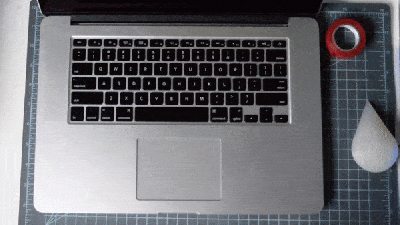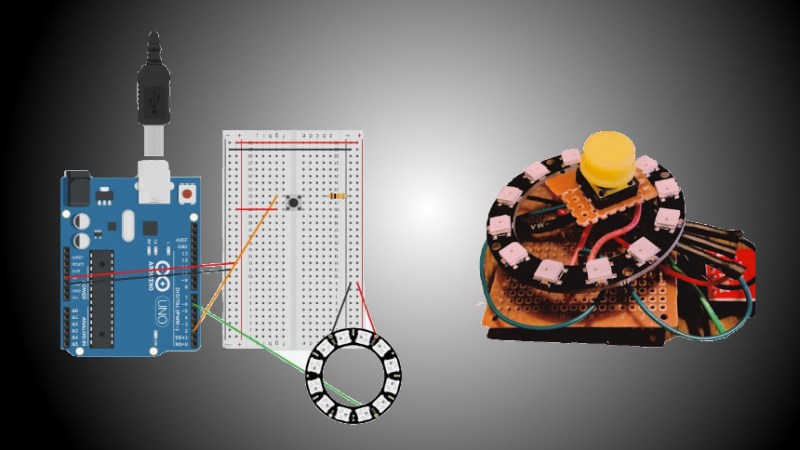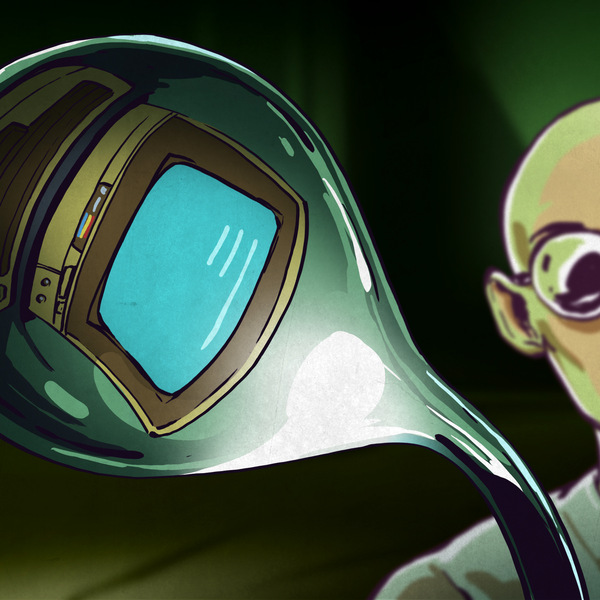The scientific community cannot always agree on how much water a person needs in a day, and since we are not Fremen, we should give it more thought than we do. For many people, remembering to take a sip now and then is all we need and the H2gO is built to remind [Angeliki Beyko] when to reach for the water bottle. A kitchen timer would probably get the job done, but we can assure you, that is not how we do things around here.
A cast silicone droplet lights up to show how much water you have drunk and pressing the center of the device means you have taken a drink. Under the hood, you find a twelve-node NeoPixel ring, a twelve millimeter momentary switch, and an Arduino Pro Mini holding it all together. A GitHub repo is linked in the article where you can find Arduino code, the droplet model, and links to all the parts. I do not think we will need a device to remind us when to use the bathroom after all this water.
Another intrepid hacker seeks to measure a person’s intake while another measures output.

















Its almost as if these people think our bodies have no system what so ever to signal if we need water…. hmm. Scientists can be complete morons sometimes.
Long as it’s not miscalibrated, or otherwise broken.
For the majority of people, you’re right. But I have no sense of thirst at all (adipsia). It’s really hard to remember to drink and know how much to drink. I’ve been to the ER multiple times with severe dehydration. I’ve been thinking about coming up with a system like this.
Yup. Every animal on Earth, or at least most of the multi-cellular ones, has been drinking enough water since the dawn of time. If you’re thirsty, drink. If you drink when you’re not thirsty, you’ll just piss more.
Unless you have adipsia I suppose. But the idea that nobody is drinking enough water is bullshit. We know when we need to drink, there’s even a word for it!
Thirst isn’t as good of an indicator as the color of your urine is. Pale yellow to clear means you’re getting enough liquid.
“Optimal amount for longevity” is not the same as “amount needed to keep you alive long enough to reproduce.” There’s very little biological imperative to provide optimal biofeedback when the minimal amount does fine.
I mean, people collapse from dehydration even when there’s water available. That alone counters your argument.
Yeah, it’s not like the hypothalamus sends similar signals for thirst and hunger where hunger was commonly mistaken when actually feeling thirsty until other more extreme effects such as dry mouth make the signal obvious. In reality it’s all clear and easily understood every time…
I’ve seen this before: https://www.nightcyclingsafety.com/product/bike-night-cycling-heart-shaped-tail-light/
” remind when to reach for the water bottle”
nice perpetuation of old scam https://www.snopes.com/fact-check/water-works-2/
Lately Coke corporation picked this up and is running different “get hydrated” ad campaigns, all hiding their source of funding, in order to make people to consume more soft drinks.
“European Hydration Institute (EHI)” is just a Coke corporation propaganda. That “hydration bot” on twitch? yep, Coke ad.
The story behind the “Eight Glasses” myth is a bit more tangled – the original 1945 report was as stated in the Snopes posting, but the subsequent years omitted the statement that most of it would be gotten from normal food consumption.
Of course dietitians committed this value to memory without question, the usual nutrition scams followed and eventually the bottled water industry (which predicts $23.75 billion in sales this yea – more than $72 per capita) took hold. Some of it “Smart” and some even gluten free (I couldn’t make this up).
(https://www.statista.com/outlook/20010000/109/bottled-water/united-states)
Guys, the chemical formula for water is H2O, not H2gO! If you want to make it sound “sciency” at least get the basics right …
… you are kidding right?
But the 2 should be subscript too so who looks silly now!
A forum that doesn’t understand MarhML.
Just a test H₂O
And a test of the sub tag, not sure this’ll work:
H2O
The idea that we need “8 glasses of water a day” is one of those myths that no-one seems to know the origin. Its the same with “2 litres” or “your urine should be pale yellow”. It mostly seems to stem from the alternative health crowd (“wellness” and self-labelled health gurus with no recognized qualifications in any field) blaming vague ailments like fatigue on something basic like hydration. Of course we need water to live, and of course sufficient water is required for optimum health – but the body has evolved ways of coping with variation in water intake – otherwise we wouldn’t have colonized areas that didn’t have much fresh/clean water. We get water from the food we eat, and it is even made in our cells via cellular respiration (although, figures put that at only 300ml for 2000kcal). There are even myths that “caffeinated drinks dehydrate you” which is bizarre since they are 98% water (you really don’t lose more water than you get from coffee). Beer and wine are also both hydrating, with beer being almsot the only source of fluid for
I’ll admit I tend to get slightly dehydrated in winter – in summer, the heat means I tend to overcompensate. But using technology to remind someone of something that we (well, most of us) have a basic instinct for seems pointless. It also implies we know the optimum amount of water one should drink (we really don’t). I don’t mean to sound cynical, nothing wrong with little projects like this, but I think it just perpetuate certain myths about health, and it also plays into the idea that technology can solve all our health problems.
Yes, there are plenty of myths out there. Absolutely. But getting the water you need from *water* means that you don’t actually eat when you’re just thirsty, which happens *all the time*. There’ve been multiple clinical trials at this point, over a decade, that have shown that drinking water before a meal reduces calorie intake at the meal.
And it’s not like this is hard to understand: sure, you can get water from food, but you get *food* along with it that you might not have needed. The reasoning’s simple – you need water every few days to survive, but you can go weeks without food. So obviously, your body expects you to *drink* far more than you *eat*.
And, of course, if you’re an athlete, or in hot weather, you get dehydrated quickly, so proactively drinking water makes sense. It’s just like if you’re a truck towing a heavy load – you don’t wait until the fuel warning light comes on when you’re on a highway to get gas, as you might not have enough time to make it to the next stop.
“I don’t mean to sound cynical, nothing wrong with little projects like this, but I think it just perpetuate certain myths about health”
The problem, again, is that while there are plenty of myths out there, there’s very little *downside* to drinking ~8 cups of water a day. The problem isn’t the practice of doing it. The problem is caused by the myths that popped up around them, so attack the stupid myths, not the basic practice. It protects against dehydration and helps control appetite. That’s enough.
I always assumed that intake includes the water that is contained in food.
And yes there really is a minimum, but I’m not sure that the minimum guideline should be that often quoted amount, nor that we should really use a day as the standard period when we set a standard.
But in a world where people consume Tide pods and die then the next one does the same.. well, they need to be told stuff I guess.